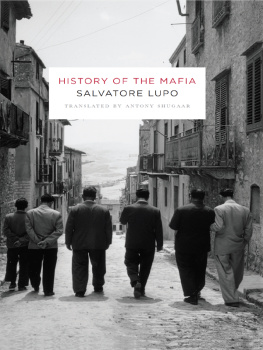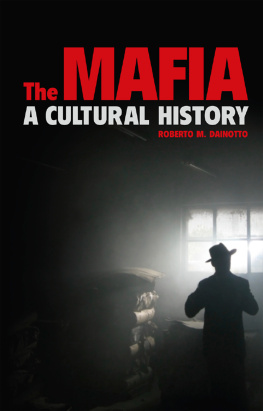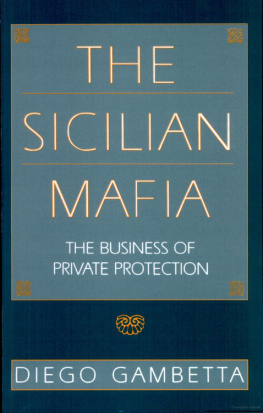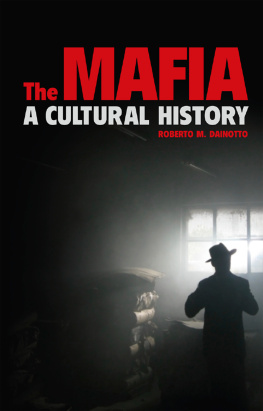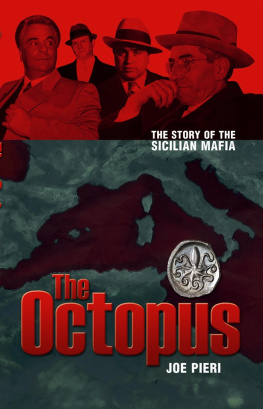HISTORY OF THE MAFIA
HISTORY OF THE MAFIA
SALVATORE LUPO
TRANSLATED BY ANTONY SHUGAAR
COLUMBIA UNIVERSITY PRESS / NEW YORK
COLUMBIA UNIVERSITY PRESS
Publishers Since 1893
New York Chichester, West Sussex
cup.columbia.edu
Copy 1996 Donzelli Editore
Translation copy 2009 Columbia University Press
Foreword copy 2009 Antony Shugaar
All rights reserved
E-ISBN 978-0-231-50539-0
Library of Congress Cataloging-in-Publication Data
Lupo, Salvatore, 1951
[Storia della mafia. English]
History of the mafia / Salvatore Lupo ; translated by Antony Shugaar.
p. cm.
Includes bibliographical references and index.
ISBN 978-0-231-13134-6 (cloth : alk. paper)
1. mafiaItalyHistory. I. Title.
HV6453.I8L8613 2009
364.10 60945dc22 2009011765
A Columbia University Press E-book.
CUP would be pleased to hear about your reading experience with this e-book at .
References to Internet Web sites (URLs) were accurate at the time of writing. Neither the author nor Columbia University Press is responsible for URLs that may have expired or changed since the manuscript was prepared.
CONTENTS
In the late 1980s, when I was covering Italys booming media business, a Milan advertising executive provided me with a subtle insight into the raucous debate then under way over the Italian governments efforts to maintain its television monopoly.
Its like a man walking his dog through a dangerous part of town, he explained. The man actually wants the dog to look completely uncontrollable so that potential muggers will steer clear.
So, even as Italian media tycoons and other aspiring tycoons were struggling to block a proposed government clamp-down, they were loudly proclaiming to anyone who would listenespecially to foreign media companies considering entry into the Italian marketthat it was impossible to work with the reckless and unpredictable Italian government. (This at a time when the prime minister of Italy, Bettino Craxi, regularly vacationed with the countrys most powerful media tycoon, Silvio Berlusconi, during the long August holidays; Craxi was also Berlusconis best man at the tycoons second wedding.)
Things in Italy, in fact, are often not quite what they seem; the real messages are often embroidered within the hems of the ostensible messages.
No study of Italian political history can ignore the existence of the mafia, and as Salvatore Lupo explains in this important book, the existence and meaning of the Mafia are lessand morethan they appear.
Another story from the late 1990s offers an exquisite paradox: Silvio Berlusconi (who at the time had served briefly as prime minister and would begin a second term shortly thereafter) had just added the Standa chain of department stores to his vast media and real estate holdings. There was a problem, though: the Standa stores in Sicily kept burning down. Then, inexplicably, the apparent cases of arson stopped.
One of the flagships of Berlusconis media empire wasand remainsthe newsweekly Panorama. In this delicate period, the magazine began publishing a series of hard-hitting exposs on Berlusconis awkward dilemma and the possibility that negotiations with the Mafia had made the problem go away.
I was interested in the nexus between politics and media and had written on the subject for the Columbia Journalism Review. When I called my contacts in an attempt to understand why Berlusconis own media vehicles were focusing on allegations of his ties with the Mafia (could it have been simple crusading journalism?), I was presented with this elegant but Byzantine theorem: the editor in chief of Panorama was about to enter negotiations with Berlusconi for the renewal of his contract. For Berlusconi to fire him in the wake of a series of sharply critical articles accusing the media tycoon of Mafia ties would have looked embarrassing. The editoraccording to this piece of conspiracy theorizing, anywaythus greatly strengthened his hand in the ensuing negotiations.
The English term ulterior motives is rendered in Italian as secondi fini: literally, second objectives. The sense is only slightly different, but it offers Italians the possibility of referring to secondi, terzi, quarti, e quinti finior second-, third-, fourth-, and fifth-order ulterior motives. Like the legendary 120 words in Inuit to describe snow, it seems appropriate that Italian should be capable of describing so many levels of conflicting or concealed objectives.
This book explores, first and foremost, and in admirable if exhaustive detail, the hidden levels at play in the phenomenology of the Sicilian mafia. Lupo attempts to establish just what the Mafia is, examining various previous hypotheses that range from an inbred folk tradition to a powerful international octopus, to use the Italian slang term (la piovra). In so doing he describes patterns and histories that offer eloquent illustrations of the smoke and mirrors concealing all mafia structures.
Duplicity is the bedrock of Mafia tactics. One owner of a Sicilian citrus grove subleases it to a Mafia custodian, whose responsibility it is to prevent theft of the fruit before harvest and to negotiate the final contract with the fruit merchant who will harvest the citrus crop and sell it.
Imagine his surprise and dismay when the fruit merchant contacts the owner of the grove to complain that the Mafia custodian has allowed several other merchants to pre-harvest the grove, leaving slim pickings for him, in exchange for the full price negotiated and paid. At this point, the owner of the citrus grove tries to fire the custodian: nothing doing. He tries to sell the grove, and is clearly informed that to do so would be a fatal insult to the mafioso. The rules are iron-bound, although they are grounded in a duplicitous alternate underworld.
This is the same pattern found in a Mafia boss ordering his underlings and associatesoriginally agricultural custodians and laborers, though the pattern persisted in the new urban settings in which the Mafia later evolvedto steal horses and cattle, so that he could first express his condolences and outrage at the brazen theft, and then offer to see if he could make an arrangement to recover the property.
Another nexus of duplicity, according to Lupo, is in the area of police informants and omert, the much bruited Mafia code of honorable silence. Omert, notes Lupo, understood as a sense of moral repulsion with respect to the idea of availing oneself of the legal system, may perhaps represent a general value, an ideal model of behavior of the Sicilian populace and, in particular, of the larger criminal universe; certainly, it is no guide to the actual behavior of mafiosi, whoas we have seen over and overcollaborate with the law whenever and however it furthers their own interests. So that no one is more likely to inform to the police than mafiosi (after all, it is they who have the information), but then the doubt remains as to whether that information is a way of manipulating the police.

